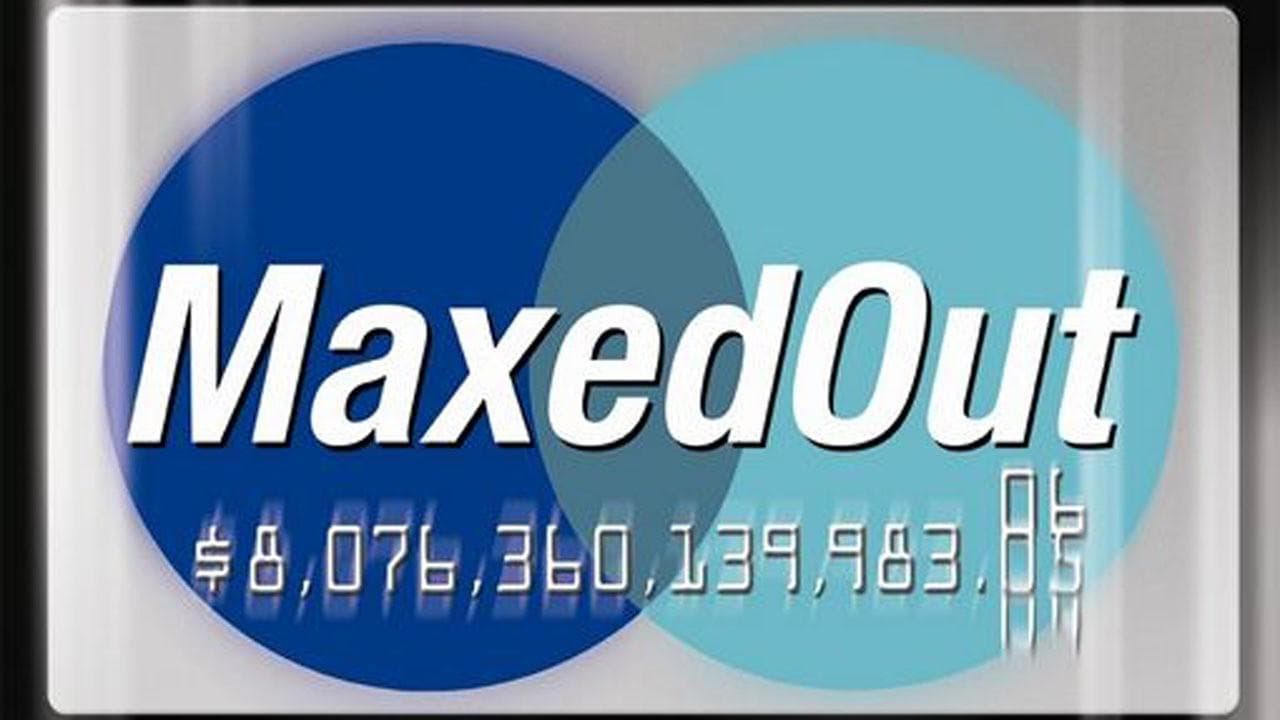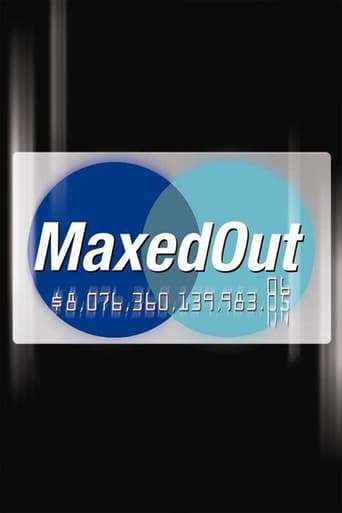

Awesome Movie
... View Morean ambitious but ultimately ineffective debut endeavor.
... View MoreThe movie's neither hopeful in contrived ways, nor hopeless in different contrived ways. Somehow it manages to be wonderful
... View MoreStory: It's very simple but honestly that is fine.
... View MoreMaxed Out: Hard Times, Easy Credit and the Era of Predatory Lenders is an independent feature-length documentary that chronicles abusive practices in the credit card industry.It uses interviews with creditors, debtors, academics, and others to illustrate its story.The main premises of the documentary is that banks and other creditors deliberately market to people who are more likely to have problems paying and that the creditors benefit from connections to government, the debt collection industry, and from lawmaker apathy.Director James D. Scurlock takes on America's debt crisis. Consequently, he touches on related issues like race, corporate malfeasance, and political subterfuge. His multi-media approach incorporates statistics, news excerpts, and interviews, but it's rarely dull. Instead of New York and Los Angeles, he concentrates on mid-size cities, like Minneapolis, Oklahoma City, and Seattle. Plenty of small towns also come into play. Though he never presses the point himself, Scurlock allows his subjects to note the similarities between the credit industry and the drug trade. One thing he neglects to mention, however, is pride. If house payments are ruining your life, selling that property may be the only solution. In most cases, however, it's hard not to feel for those individuals who didn't know what they were getting into before they signed their lives away. For some viewers, this will be a dispiriting documentary as three subjects recount the suicides of relatives who found their debt too much to bear but in explaining exactly how lenders and creditors make money, Maxed Out can help others to avoid some of their most egregious practices. In other words, debt may be a downer, but knowledge is power.
... View MoreMaxed Out (2006) ** (out of 4) Sometimes interested but way too one-sided documentary about the evils of banks, credit lenders and pretty much anyone or thing that is rich. The documentary features interviews with people who have lost their homes and other items as well as people who try to explain what the banks are up and why they need poor people to continue to make money. The biggest reasons for this is that people who are late each month have to then pay high late fees and bigger interest fees. The film makes the argument that without all of these additional fees the people at the top wouldn't be bringing in as much money. The other example is credit card companies stalking colleges looking for newly fresh 18-year-olds needing quick money. MAXED OUT tackles an interested subject matter and I personally don't have a problem with them trying to show that banks are evil. I've been on both sides of the coin of being in trouble financially and also working for a bank so I understand how things work. With that said, not once does the documentary ever blame people who borrow stuff that they can't pay back. I mean, if someone makes $2000 a month and get a loan at $3000 a month then of course it's going to lead to trouble. This documentary, even with that example, would have you believe it's the bank's fault and I think this one-sided nature is what really killed the film. There are some sad stories told, some dramatic ones but at the same time there are way too many examples of where people are to blame for what they're going through and not once does the documentary simply ask them what they were thinking. Yes, the financial institute is full of crooked people. Yes it's good that people be warned about them. However, people still need to take control of what they do and this documentary simply ignores that. For the majority of the 87-minutes, the documentary simply looks at the bad things or the questionable things that people do. It also shines a light on certain "credit experts" and mentions how they're usually connected to certain things that speak as being good.
... View MoreThe credit card companies have been maxing out people for decades. In this documentary, it looks at it's predatory lending policies especially towards college students on campus. The credit cards were always meant as a safety net or if you didn't have money. Some people used their credit cards as life support in emergency situations. Our financial situation in this country has further deteriorated since this documentary. You don't have to watch Michael Moore's film to see the situation's effect. Armed bank robbers are less deadly than the bank robbers in suits and ties who walk in on Wall Street. They may not have guns but they have the access and ability to destroy our economic situation far more than armed bank robbers like Bonnie and Clyde etc. Bank robberies don't happen like that anymore. It's done on the internet or in the policy meetings. The people you meet in this documentary are real and authentic. Debt has driven people to commit suicide because of the harassing phone calls and letters threatening to take away. That's the bottom dollar. Are the creditors far more interested in driving people to commit suicide or lose their sanity than get the money? It's a shame that it's going on and that people will be in debt until their dead. It's a perverted kind of freedom to be in debt like having a noose around your neck and the debt gets bigger than smaller with rising interest rates, penalties, and no breaks. Whatever happened to compassion and mercy in this society?
... View MoreOK, I want to say how horrible it is that the two college kids from this film took their own lives and my heart goes out to their family. But honestly this film can be summed up by one word, choices, that is what all these people made, choices. They chose to get credit cards, they chose to use them, they chose to spend money they didn't have and I don't want to sound heartless but they chose to end it all. I'm sorry but when I have recently watched documentaries on Darfur, 9/11, the Iraq War and Catholic Priests abusing children it's hard for me to feel sorry for people with credit card dept of their own choosing. All those other documentaries focused on people who's situations were forced upon them by life circumstances, these people brought it all upon themselves. Then the film tries to make rich people out as the bad guys, to me rich people are in this case the smart people, they can actually afford the things they buy and they do live within their means. It's the middle class that always wants more and more stuff, which there are two things wrong with that, one they buy things they want and can't afford and in most cases don't need and won't really use. Two, they are not willing to earn the money it takes to buy those things before they buy them. People need to decide first what things are really important for them to have in their life and then decide how much money and what job they will need to be able to afford that life. Problem being, everyone would want to have everything but few are willing to work hard enough to afford that. My other question, when they are interviewing these people they live in houses filled with stuff, hello! Show me the person living in an empty apartment with the electricity turned off with a pillow and a blanket complaining about his dept then we might talk. So the bottom line as I see it is, the real problem is why do we all want so damn many things.
... View More